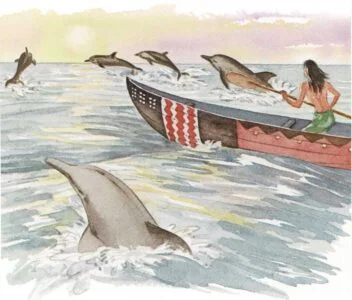I Leave the Island
from Island of the Blue Dolphins by Scott O’Dell
The book from which this story is taken is based on historical facts.
When a ship comes to take a small band of Indians to the mainland,
twelve-year-old Karana is left behind. She is certain the ship will turn
back for her, but it does not. Except for a pack of wild dogs, she is
alone.
sk sk
Summer is the best time on the Island of the Blue Dolphins. The sun is
warm then and the winds blow milder out of the west, sometimes out of
the south.
It was during these days that the ship might return and now I spent most
of my time on the rock, looking out from the high headland into the
east, toward the country where my people had gone, across the sea that
was never-ending.
Once while I watched I saw a small object which I took to be the ship,
but a stream of water rose from it and I knew that it was a whale
spouting. During those summer days I saw nothing else.
The first storm of winter ended my hopes. If the white men’s ship were
coming for me it would have come during the time of good weather. Now I
would have to wait until winter was gone, maybe longer.
The thought of being alone on the island while so many suns rose from
the sea and went slowly back into the sea filled my heart with
loneliness. I had not felt so lonely before because I was sure that the
ship would return as Matasaip had said it would. Now my hopes were dead.
Now I was really alone. I could not eat much, nor could I sleep without
dreaming terrible dreams.
The storm blew out of the north, sending big waves against the island
and winds so strong that I was

unable to stay on the rock. I moved my bed to the foot of the rock and
for protection kept a fire going throughout the night. I slept there
five times. The first night the dogs came and stood outside the ring
made by the fire. I killed three of them with arrows, but not the
leader, and they did not come again.
On the sixth day, when the storm had ended, I went to the place where
the canoes had been hidden, and let myself down over the cliff. This
part of the shore was sheltered from the wind and I found the canoes
just as they had been left. The dried food was still good, but the water
was stale, so I went back to the spring and filled a fresh basket.
I had decided during the days of the storm, when I had given up hope of
seeing the ship, that I would take one of the canoes and go to the
country that lay
toward the east. I remember how Kimki, before he had gone, had asked the
advice of his ancestors who had lived many ages in the past, who had
come to the island from that country, and likewise the advice of Zuma,
the medicine man who held power over the wind and the seas. But these
things I could not do, for Zuma had been killed by the Aleuts, and in
all my life I had never been able to speak with the dead, though many
times I had tried.
Yet I cannot say that I was really afraid as I stood there on the shore.
I knew^T^ that my ancestors had crossed the sea in their canoes, coming
from that place which lay beyond. Kimki, too, had crossed the sea. I was
not nearly so skilled with a canoe as these men, but I must say that
whatever might befall me on the endless waters did not trouble me. It
meant far less than the thought of staying on the island alone, without
a home or companions, pursued by wild dogs, where everything reminded me
of those who were dead and those who had gone away.
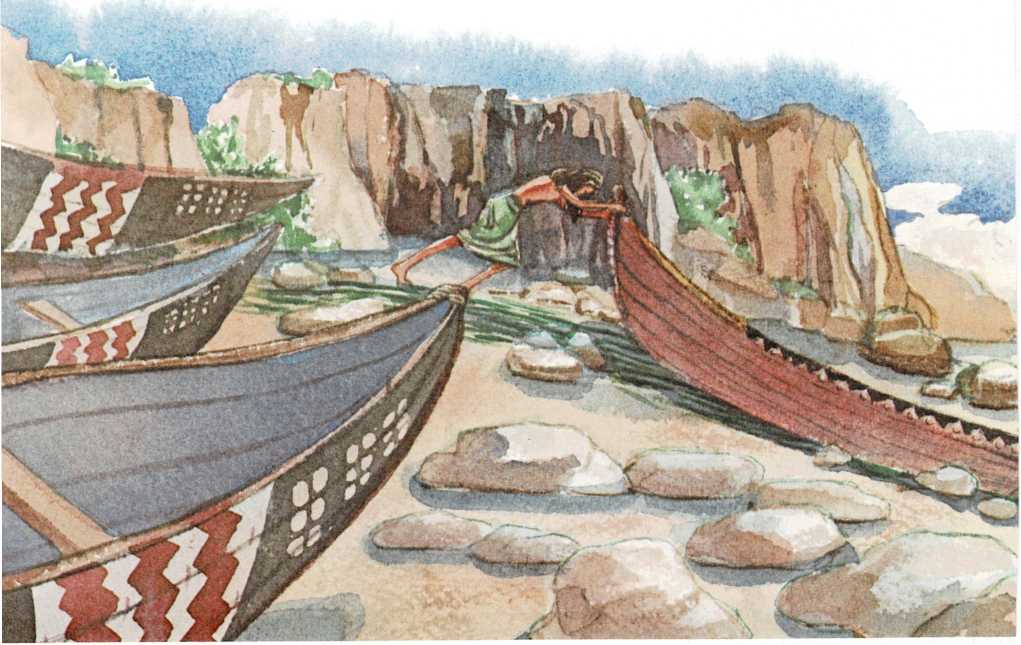
Of the four canoes stored there against the cliff, I chose the smallest,
which was still very heavy because it could carry six people. The task
that faced me was to push it down the rocky shore and into the water, a
distance four or five times its length.
This I did by first removing all the large rocks in front of the canoe.
I then filled in all these holes with pebbles and along this path laid
down long strips of kelp, making a slippery bed. The shore was steep and
once I got the canoe to move with its own weight, it slid down the path
and into the water.
The sun was in the west when I left the shore. The sea was calm behind
the high cliffs. Using the two-bladed paddle I quickly skirted the south
part of the island. As I reached the sandspit the wind struck. I was
paddling from the back of the canoe because you can go faster kneeling
there, but I could not handle it in the wind.
Kneeling in the middle of the canoe, I paddled hard and did not pause
until I had gone through the tides that run fast around the sandspit.
There were many small waves and I was soon wet, but as I came out from
behind the spit the spray lessened and the waves grew long and rolling.
Though it would have been easier to go the way they slanted, this would
have taken me in the wrong direction. I therefore kept them on my left
hand, as well as the island, which grew smaller and smaller, behind me.
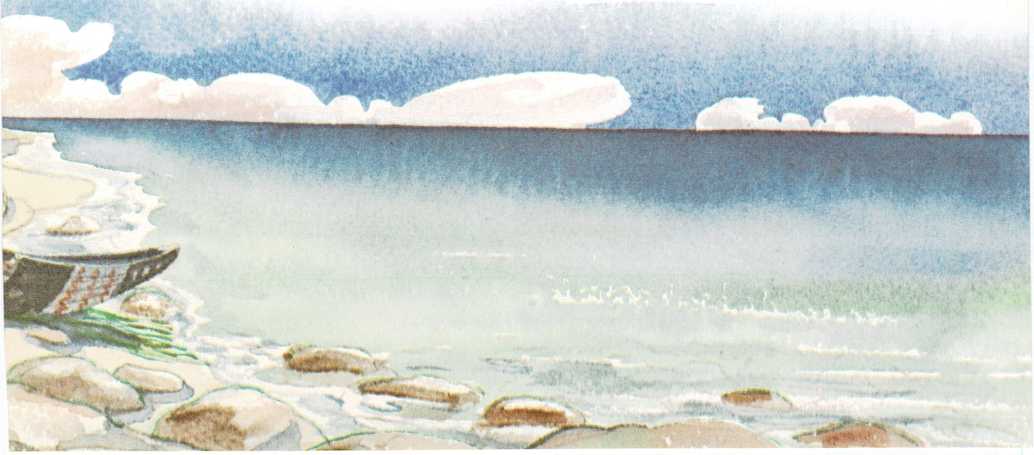
At dusk I looked back. The Island of the Blue Dolphins had disappeared.
This was the first time that I felt afraid.
There were only hills and valleys of water around me now. When I was in
a valley I could see nothing and when the canoe rose out of it, only the
ocean stretching away and away.
Night fell and I drank from the basket. The water cooled my throat.
The sea was black and there was no difference between it and the sky.
The waves made no sound among themselves, only faint noises as they went
under the canoe or struck against it. Sometimes the noises seemed angry
and at other times like people laughing. I was not hungry because of my
fear.
The first star made me feel less afraid. It came out low in the sky and
it was in front of me, toward the east. Other stars began to appear all
around, but it was this one I kept my gaze upon. It was in the figure
that we call a serpent, a star which shone green and which I knew. Now
and then it was hidden by mist, yet it always came out brightly again.
Without this star I would have been lost, for the waves never changed.
They came always from the same direction and in a manner that kept
pushing me away from the place I wanted to reach. For this reason the
canoe made a path in the black water like a snake. But somehow I kept
moving toward the star which shone in the east.
This star rose high and then I kept the North Star on my left hand, the
one we call “the star that does not move.” The wind grew quiet. Since it
always died down when the night was half over, I knew how long I had
been traveling and how far away the dawn was.
About this time I found that the canoe was leaking. Before dark I had
emptied one of the baskets in which food was stored and used it to dip
out the water that came over the sides. The water that now moved around
my knees was not from the waves.
I stopped paddling and worked with the basket until the bottom of the
canoe was almost dry. Then I searched around, feeling in the dark along
the smooth planks, and found the place near the bow where the water was
seeping through a crack as long as my hand and the width of a finger.
Most of the time it was out of the sea, but it leaked whenever the canoe
dipped forward in the waves.
The places between the planks were filled with black pitch which we
gather along the shore. Lacking this, I tore a piece of fiber from my
skirt and pressed it into the crack, which held back the water.
Dawn broke in a clear sky and as the sun came out of the waves I saw
that it was far off on my left. During the night I had drifted south of
the place I wished to go, so I changed my direction and paddled along
the path made by the rising sun.
There was no wind on this morning and the long waves went quietly under
the canoe. I therefore moved faster than during the night.
I was very tired, but more hopeful than I had been since I left the
island. If the good weather did not change I would cover many leagues
before dark. Another night and another day might bring me within sight
of the shore toward which I was going.
Not long after dawn, while I was thinking of this strange place and what
it would look like, the canoe began to leak again. This crack was
between the same planks, but was a larger one and close to where I was
kneeling.
The fiber I tore from my skirt and pushed into the crack held back most
of the water which seeped in whenever the canoe rose and fell with the
waves. Yet I could see that the planks were weak from one end to the
other, probably from the canoe being stored so long in the sun, and that
they might open along their whole length if the waves grew rougher.
It was suddenly clear to me that it was dangerous to go on. The voyage
would take two more days, perhaps longer. By turning back to the island
I would not have nearly so far to travel.
Still I could not make up my mind to do so. The sea was calm and I had
come far. The thought of turning back after all this labor was more than
I could bear. Even greater was the thought of the deserted island I
would return to, of living there alone and forgotten. For how many suns
and how many moons?
The canoe drifted idly on the calm sea while these thoughts went over
and over in my mind, but when I saw the water seeping through the crack
again, I picked up the paddle. There was no choice except to turn back
toward the island.
I knew that only by the best of fortune would I ever reach it.
The wind did not blow until the sun was overhead. Before that time I
covered a good distance, pausing only when it was necessary to dip water
from the canoe. With the wind I went more slowly and had to stop more
often because of the water spilling over the sides, but the leak did not
grow worse.
This was my first good fortune. The next was when a swarm of dolphins
appeared. They came swimming out of the west, but as they saw the canoe
they turned around in a great circle and began to follow me. They swam
up slowly and so close that I could see their eyes, which are large and
the color of the ocean. Then they swam on ahead of the canoe, crossing
back and forth in front of it, diving in and out, as if they were
weaving a piece of cloth with their broad snouts.
Dolphins are animals of good omen. It made me happy to have them
swimming around the canoe, and though my hands had begun to bleed from
the chafing of the paddle, just watching them made me forget the pain. I
was very lonely before they appeared, but now I felt that I had friends
with me and did not feel the same.
The blue dolphins left me shortly before dusk. They left as quickly as
they had come, going on into the west, but for a long time I could see
the last of the sun shining on them. After night fell I could still see
them in my thoughts and it was because of this that I kept on paddling
when I wanted to lie down and sleep.
More than anything, it was the blue dolphins that took me back home.
Fog came with the night, yet from time to time I
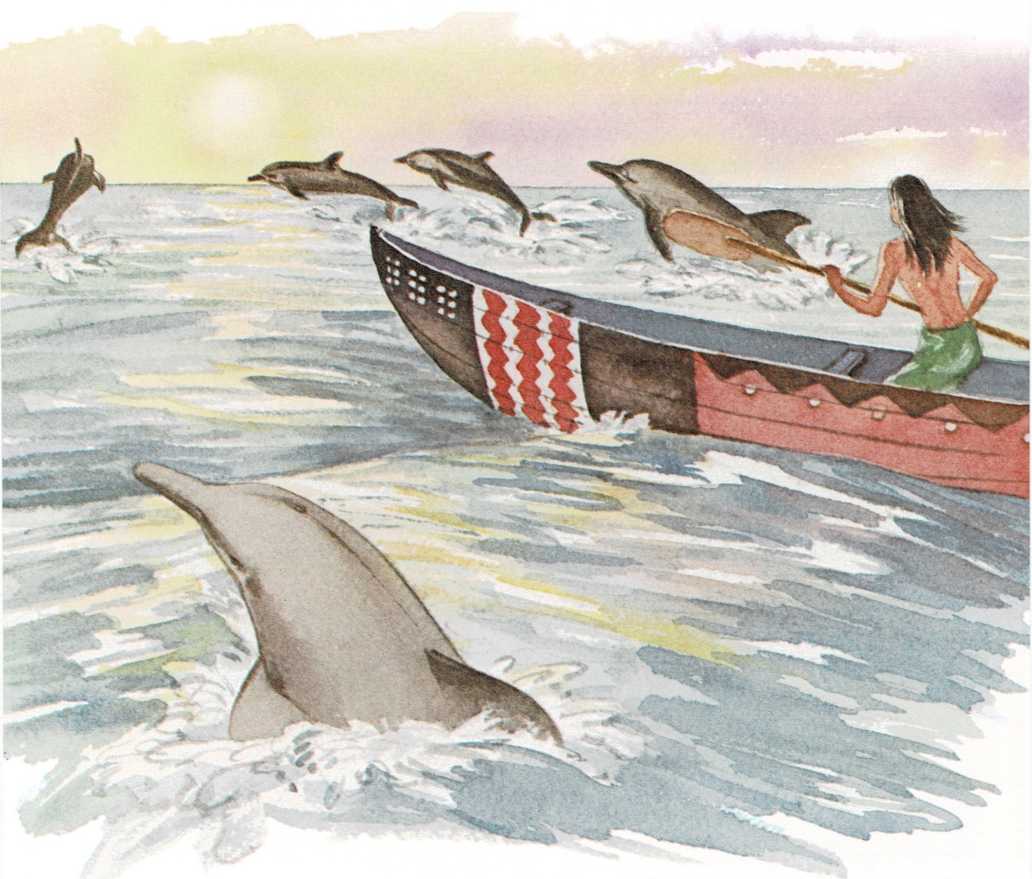
could see the star that stands high in the west, the red star called
Magat which is part of the figure that looks like a crawfish and is
known by that name. The crack in the planks grew wider so I had to stop
often to fill it with fiber and to dip out the water.
The night was very long, longer than the night before. Twice I dozed
kneeling there in the canoe, though I was more afraid than I had ever
been. But the morning broke clear and in front of me lay the dim line of
the island like a great fish sunning itself on the sea.
I reached it before the sun was high, the sandspit and its tides that
bore me into the shore. My legs were stiff from kneeling and as the
canoe struck the sand I fell when I rose to climb out. I crawled through
the shallow water and up the beach. There I lay for a long time, hugging
the sand in happiness.
I was too tired to think of the wild dogs. Soon I fell asleep. I was
awakened by the waves dragging at my
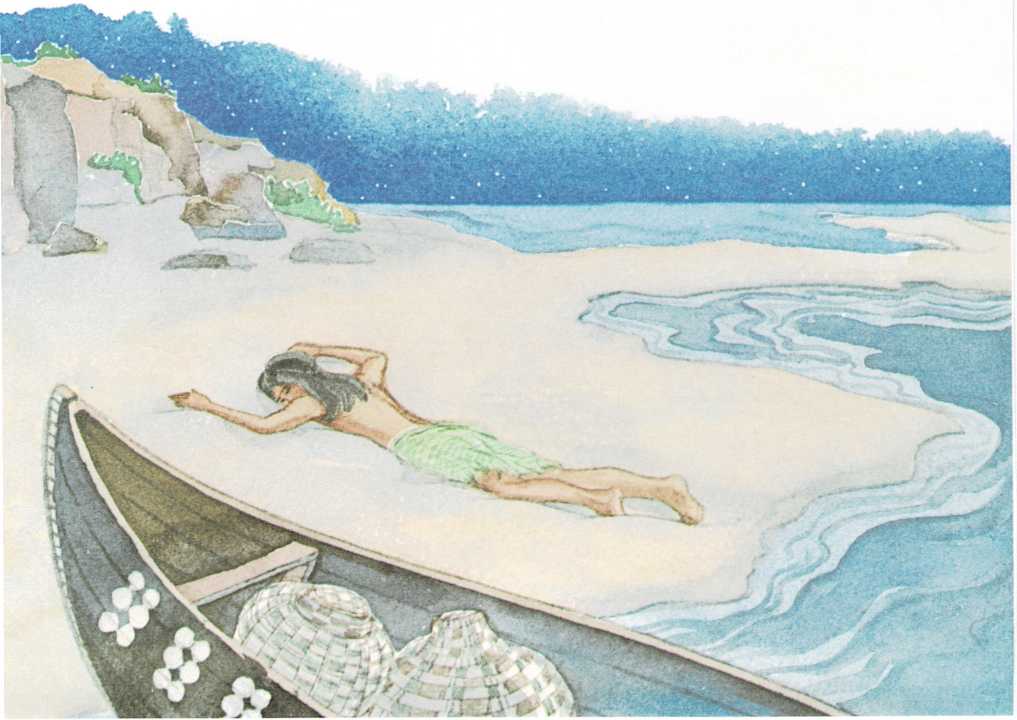
feet. Night had come, but being too tired to leave the sandspit, I
crawled to a higher place where I would be safe from the tide, and again
went to sleep.
In the morning I found the canoe a short distance away. I took the
baskets, my spear, and the bow and arrows, and turned the canoe over so
that the tides could not take it out to sea. I then climbed to the
headland where I had lived before.
I felt as if I had been gone a long time as I stood there looking down
from the high rock. I was happy to be home. Everything that I saw—the
otter playing in the kelp, the rings of foam around the rocks that
guarded the harbor, the gulls flying, the tides moving past the
sandspit—filled me with happiness.
I was surprised that I felt this way, for it was only a short time ago
that I had stood on this same rock and felt that I could not bear to
live here another day.
I looked out at the blue water stretching away and all the fear I had
felt during the time of the voyage came back to me. On the morning I
first sighted the island and it had seemed like a great fish sunning
itself, I thought that someday I would make the canoe over and go out
once more to look for the country that lay beyond the ocean. Now I knew
that I would never go again.
The Island of the Blue Dolphins was my home; I had no other.
Will the ship return for Karana? If not, how will a twelve-year-old girl
manage to survive on her own? What will she eat? Where will she find
shelter? And how will she protect herself from the wild dogs? You can
find out by reading the book, Island of the Blue Dolphins. Once you
start it, you won’t be able to put it down. You may also want to try
Call It Courage by Armstrong Sperry, which is about a Polynesian boy
who overcomes his fear of the ocean.

